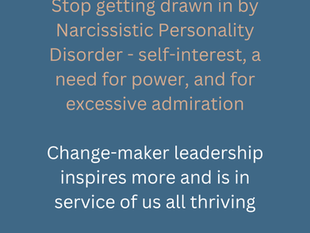
Narcissistic vs. Change-Maker Leaders: Motivation and Impact
0
2
0

In the first post we looked at igniting change and finding our spark in challenging times. In the second we considered a world demanding constant evolution and how the
Change-Maker Leader isn't just an asset – they are the architects of a better tomorrow. And I left you with a question "Who inspires you to positive action right now? How? Why?"
It's here that I have to admit that the inspiration for this series of posts came from a deep frustration with how too many people are attracted to leaders who seem to inspire change but are narcissistic. I'm not just talking about the obvious public names but the power players we know in all walks of our life and work. Some don't even hide it - marked by an inflated sense of self-importance, a deep need for excessive attention and admiration, troubled relationships, and a lack of empathy for others - but they attract followers.
And to make this more edgy I think too many of us, myself included, if we're really honest with ourselves, have some of these narcissistic tendencies. Our current systems, built too much on individualism, and ongoing reality of shared loss, do not help.
"We are all broken" said Ernest Hemingway
So I'd like to start to reframe. While both Narcissistic Leaders and Change-Maker Leaders might initially appear to be drivers of significant shifts, their underlying motivations and the impact they have are fundamentally different, making a Narcissistic Leader decidedly not a true Change-Maker Leader. Here’s why:
Motivation: Self-Interest vs. Societal Good.
A core characteristic of a Change-Maker Leader is a deep care for people and the planet, balancing commercial success with doing good for everyone and thinking about the long-term effects of their decisions. They are driven by a vision of a better future and a strong personal reason for wanting to make it happen.
In stark contrast, a Narcissistic Leader is primarily motivated by self-interest, a need for power, and excessive admiration. Their "world-changing vision" often serves to attract devout followers and fuel their own grandiosity rather than a genuine desire for collective betterment.
Empathy and Collaboration
Change-Maker Leaders are good at understanding people, seeing the bigger picture, and working collaboratively with others to get everyone on the same page. They value different opinions and create welcoming environments. They are galvanizing and connecting, rallying support while understanding the importance of collaboration, sharing credit, and empowering others.
Narcissistic Leaders, however, lack empathy. and tend to cultivate organisational cultures with reduced collaboration and diminished integrity. They may suppress dissenting opinions and reward loyalty manifested as sycophancy, hindering teamwork and innovation.
Empowerment of Others
A key trait of Change-Maker Leaders is their focus on helping others shine and become change-makers themselves by providing tools and encouragement. They understand that true leadership involves empowering a team to make their own positive impact.
Narcissistic Leaders, on the other hand, often create high dependence, discourage initiative, and may feel threatened by others' achievements. Their focus is on maintaining their own power and control rather than fostering growth in others.
Integrity and Accountability
Change-Maker Leaders act ethically, take responsibility for their actions, and align their values with their decisions. Integrity is a cornerstone.
Narcissistic Leaders, however, may display a disregard for conventional norms and rules, believing they are superior. This can lead to unethical behaviour, impulsivity, and a tendency to externalise blame for failures.
Focus on Impact
While Change-Maker Leaders balance commercial success with societal good and consider long-term impacts.
Narcissistic Leaders often prioritise their own self-interests above the collective good. Their decisions can be impulsive and risky, potentially leading to negative consequences for organisations and societies, such as financial losses and reputational damage.
Mindset towards Failure and Learning
Change-Maker Leaders learn from both wins and losses. and create safe spaces where mistakes are seen as learning opportunities. They are adaptable and resilient.
Narcissistic Leaders, however, often disregard negative feedback and have difficulty learning from their mistakes. They may view others' achievements as a threat rather than an opportunity for collective growth.
To Conclude
In essence, while a Narcissistic Leader might initiate change, it is typically driven by self-aggrandisement and a desire for control, often at the expense of others and the long-term well-being of the organisation or society.
A true Change-Maker Leader, however, is motivated by a genuine desire to create a better future through collaboration, empowerment, and a strong ethical compass. Their focus is on collective success and sustainable positive impact, a stark contrast to the self-serving nature of narcissistic leadership.
To finish Ernest Hemingway's quote "We are all broken, that's how the light gets in."
So enough of the self-serving echoes of narcissistic leadership! It’s time to ignite the true power within – the power to be a Change-Maker Leader. Let's be the architects of a better tomorrow, driven by a genuine care for people and our planet. Dare to have that world-changing vision rooted in collective betterment, not personal grandiosity. Be the one who not only sees the potential but acts with grit and optimism to unlock it.
As Mahatma Gandhi wisely said, "Be the change that you wish to see in the world".
The future belongs to those who build it with empathy, collaboration, and unwavering integrity. Let’s step into our potential and become the leaders the world truly needs.
#ChangeMakerLeadership #LeadWithEmpathy #FutureBuilders #PositiveImpact
Check out the full series of six:
Narcissistic vs. Change-Maker Leaders: Motivation and Impact
Leading Beyond Narcissism: Change-Makers and Their Followers







